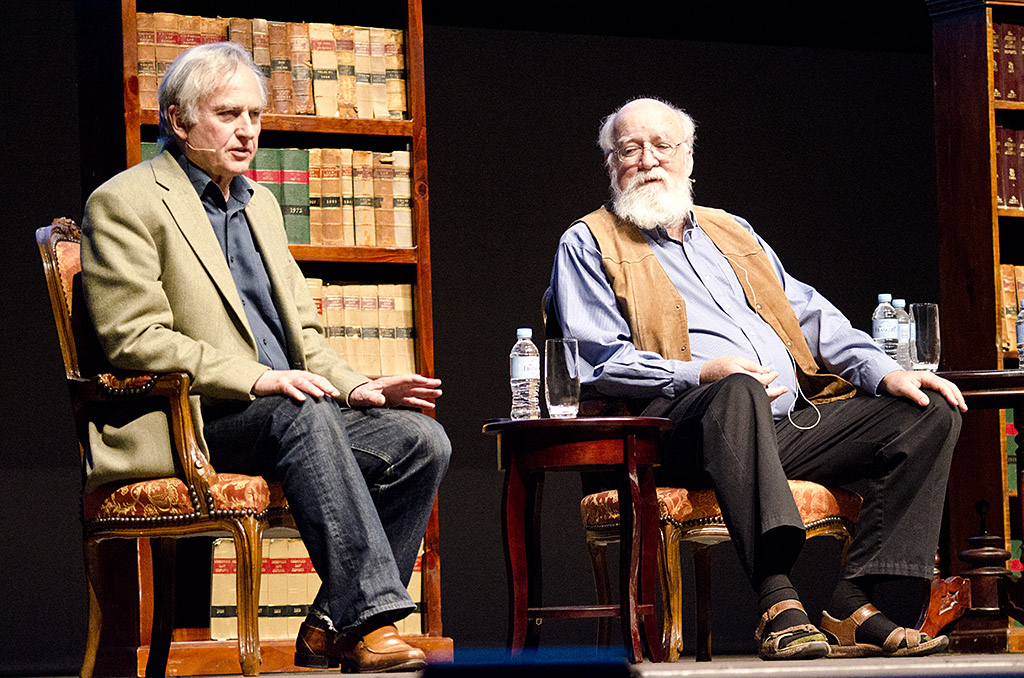
A humanist funeral ceremony: family members and friends meet to celebrate the life of a deceased love one.
It seems that primitive man, everywhere and in every culture, had an instinctive belief in some sort of existence after death. For the primitive psyche perhaps there was no other way to come to terms with the dread and mystery of death. As the traditional religions evolved, elaborate myths were created, claiming that every man had an immortal soul that survived his bodily death. In a master-stroke (deliberate or otherwise) traditional religions linked the fate of this immortal soul with good behaviour in this life. Ordinary people, conditioned as they were from early childhood to adapt to regimes of earthly reward and punishment, readily accepted this vastly magnified scheme of reward and punishment that extended into eternity. Morality, which really had its roots in human nature, became a prisoner of reward and punishment. ‘RAP morality’ (reward-and-punishment morality) is perhaps a good name for it. RAP morality gave religion an iron grip on the lives of people. As Sam Harris says in his outstanding book, The End of Faith: “Without death, the influence of faith-based religion would be unthinkable. Clearly, the fact of death is unbearable to us, and faith is little more than a shadow cast by our hope for a better life beyond the grave.”
Unspeakable atrocities were committed by the medieval Christian church in the name of saving souls. Russell tells us that “The Spaniards in Mexico and Peru used to baptize Indian infants and then immediately dash their brains out; by this means they secured these infants went to heaven..” and goes on: “In countless ways the doctrine of personal immortality in its Christian form has had disastrous effects upon morals…” The horrors of the Inquisition are too gruesome to describe. In our own time we have the phenomenon, in the Iran-Iraq war, of children being used for clearing minefields. They, and their parents as well as the commanders who let them get blown up, evidently believed that ample rewards awaited these children in paradise. (It must, however, be mentioned that reliable firsthand accounts of the use of children in human wave attacks are rare.) Suicide bombings are an everyday occurrence in Palestine, Iraq and Pakistan. So problems arising out of a belief in life after death are very contemporary and very real. And the tragic growth of suicide bombings has given them a wholly unexpected twist. How differently William Empson’s Ignorance of Death reads today!
“Heaven me, when a man is ready to die about something
Other than himself, and is in fact ready because of that,
Not because of himself, that is something clear about himself.
Otherwise I feel very blank upon this topic,
And think that though important, and proper for anyone to bring up,
It is one that most people should be prepared to be blank upon.”
In most humanist statements, there does not seem to be a pointed reference to the issue of life after death. This could be because the humanist rejection of the supernatural also entails the rejection of the idea of an immortal soul or life after death. However, the Memorandum of Association of the Indian Humanist Union (June 12, 1960) does state: “Though Humanism is not identified with any views about the factual question of life after death, it does not accept the goal of salvation. It is content to fix its attention on this life and this world. It is concerned with the preservation and furtherance of moral values in all relations and spheres of life, and with the building up of a better and happier human community.” Narsingh Narain has elaborated this further: “…There is no need for us, as Humanists, to consider the evidence for and against human survival. For whether we survive or not makes no difference to our practical ideals. Moreover, the craving for a future life is unhealthy, if only for the simple reason that our wishes can make no difference to whatever the fact may happen to be. Belief in a future life was not based on evidence. It was an expression of faith arising out of a certain mental background. The important thing is to outgrow that mental outlook, not to disprove survival, or to rule out faith altogether.”
The problem is that, while this position will be seen by humanists as being eminently logical and pragmatic, it will do nothing to induce the ordinary believer in traditional religions (to whom life after death is a fact) to re-examine his world-view. The Humanist Movement came into being to provide an alternative to traditional religions, and its main task is to address the major factors which have given traditional religions such a grip on their adherents. Of these, the two most powerful factors are: belief in a personal God; and life after death. Sam Harris is right when he says: “What one believes happens after death dictates much of what one believes about life, and this is why faith-based religion, in presuming to fill the blanks in our knowledge of the hereafter, does such heavy lifting for those who fall under its power. A single proposition – you will not die – once believed, determines a response to life that would be otherwise unthinkable.”
Humanism cannot afford to remain ‘blank’ (or agnostic) on this issue; just as it is not agnostic about a personal God. We must affirm that there is no scientific evidence for personal survival after death. However, death does not have to be equated with non-existence; although Hume (reportedly in a conversation) held that there is no more difficulty in conceiving my non-existence after death, than in conceiving my non-existence before birth, and no reason to be distressed by either. We can look upon our existence as being of two kinds: conscious, and consequential. While my conscious existence ceases with death, my consequential existence does not. In many different ways and in many different spheres every individual’s life interminably affects the future. This thought gives one responsibility and hope, and a sense of worth.

